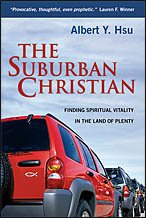Love Your Neighbor(hood)

At the heart of many critiques of suburban life is a critique of the suburbs' soul--or the lack one. So books like "The Suburban Christian" by Albert Hsu, an editor at Intervarsity Press, are more pertinent than its parochial title may suggest. Devout Christians are particularly out of sorts in the suburbs; the emphasis on prosperity and acquisitiveness is the opposite of the Christian ideal of service and sacrifice. But suburban values concern faithful and secular suburbanites alike. And Hsu, who grew up in Bloomington, Minn., has a native son's affection for malls and megachurches that moves him to look for real, and sometimes surprising solutions.
Hsu's respect for the suburbs sets him apart from other Christian takes on the burbs, like Dave Goetz's fizzy "Death By Suburb: How to Keep the Suburbs from Killing Your Soul," published earlier this year, which seemed to draw its moral situations from soap-opera suburbs. Hsu also distinguishes himself from heavy-hitting academic and media prognosticators by having a little, well, faith in the suburbs.
The suburbs, in Hsu's vision, ought to be more than neatly arranged nodes of convenience. "Instead of the job being the lead factor [in where you live], how about having community be the decisive factor. ... Choose your community, live there, work there, worship there and minister there." Hsu wants us to be intentional about where we live, and not abstractly. Investing ourselves in the physical place, in Hsu's vision, can be a route to spiritual investment. He is tempted by the idea of ditching single family homes, with their impractical land use and outsized mortgages, in favor of suburban-futurist ideas about "sixplexes," where one house holds six families with a common kitchen and living areas (New Urbanists: how's that for density?), or private homes surrounded by communal land.
Hsu presents the shortcomings of his own Christian community too, warning that megachurches—Christian mallls that entice suburban parishioners with shopping, entertainment and worship—risk becoming the culture they seek to change. Worried that suburban Christians are too comfortable, he wants them to turn back to the cities they have left to experience hardship and suffering and help heal it.
At times, Hsu allows the suburbs to stand for too many of the ills of our current culture, overemphasizing the racial and economic homogeneity or portraying materialism too strictly as a suburban phenomenon. And too much of the book is taken up with statistics and trends any newspaper reader (or pew denizen) will have already absorbed. Both these sins are available in nearly any current treatise on the suburbs. What you won't always find are Hsu's optimism and exhortation to positive action.

1 Comments:
Nice review. guess there's a spiritual side to everything. Even suburbia.
Post a Comment
<< Home